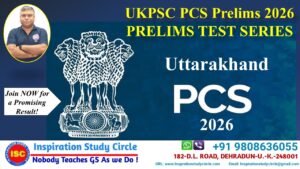
UKPSC- PCS 2026 Prelims Test Series
UKPSC- PCS 2026 Prelims Test Series Table of Contents UKPSC- PCS 2026 Prelims Test Series The Uttar Pradesh Provincial Civil
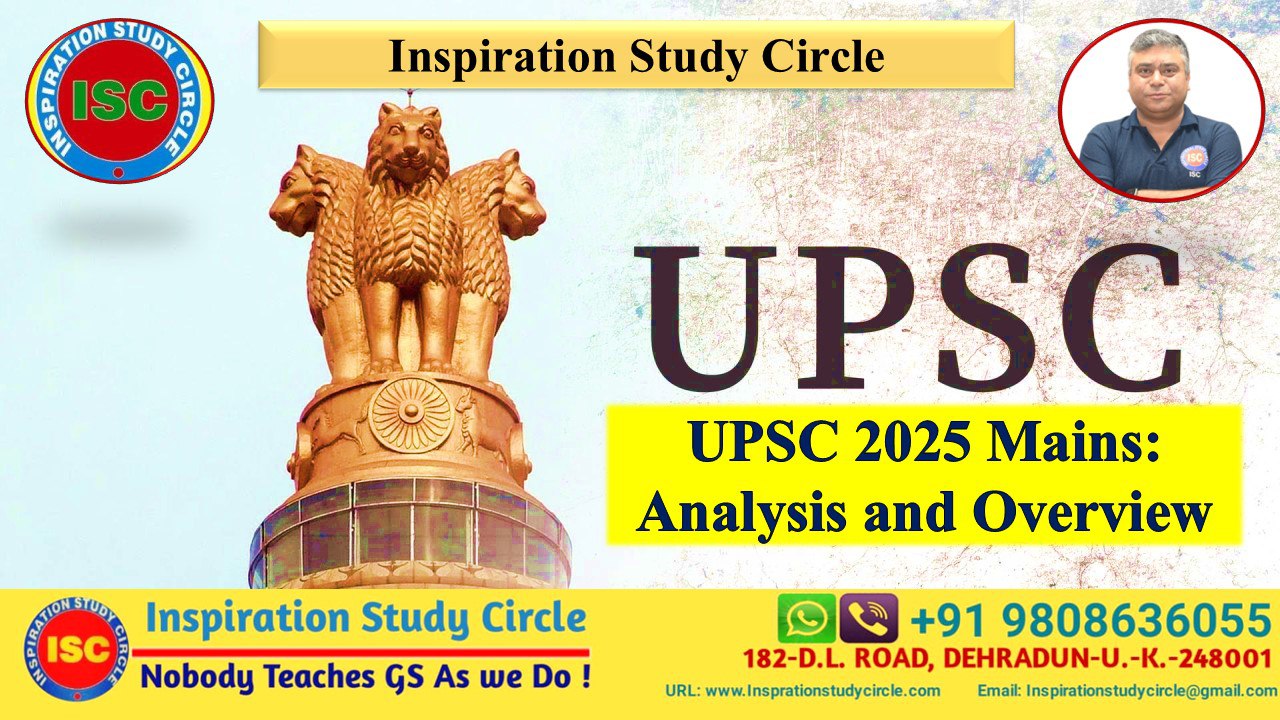
The UPSC Mains 2025 analysis indicated a paper that was a balance of static and analytical questions, with increased conceptual depth and interdisciplinary linkages compared to previous years.
The UPSC Mains 2025 exam dates are from August 22 to August 31, 2025, with the examination taking place on the first two weekends.
Detailed Schedule:
The exam highlighted a need for analytical depth, integration of static knowledge with current events, and strong answer-writing skills. Many aspirants who appeared noted a focus on themes like climate change, e-governance, and specific policy initiatives such as the Production Linked Incentive (PLI) scheme. Aspirants were challenged by complex questions requiring critical thinking, emphasizing the importance of holistic preparation and refined answer structuring.
The Essay paper was particularly abstract and philosophical, while GS Paper 1 saw a significant focus on Geography and History. GS Paper 2 highlighted the importance of Governance and Social Justice, and GS Paper 3 emphasized economy, environment, and security issues like Left Wing Extremism. The exam demonstrated a trend towards testing conceptual understanding and current affairs, rather than just factual recall, requiring a blend of static knowledge and analytical skills. GS Paper 1 maintained a balance of static and analytical questions, while GS Paper 2 emphasized contemporary issues and comparative analysis. GS Paper 3 was considered the most challenging due to its focus on technology, environment, and economics, while GS Paper 4 (Ethics) tested practical application and normative reasoning through case studies. For upcoming aspirants, preparing with a focus on current affairs, conceptual clarity, interlinking subjects, and practicing answer writing is crucial.
GS Paper 1 (Indian Heritage, Culture, History, and Geography):
This paper was moderately difficult, featuring both static knowledge and application-based questions. Key areas included Harappan architecture, modern history’s social reform movements, and physical and economic geography.
GS Paper 2 (Polity, Governance, Social Justice, International Relations):
This paper showcased a balanced coverage of its syllabus, focusing on contemporary themes like tribunal reforms, digital diplomacy, and UN reform. It also included comparative questions, such as comparing India and the USA on pardoning powers.
GS Paper 3 (Technology and Environment):
This paper proved to be the most challenging for many candidates. It heavily focused on technology, environment, and economics, requiring an in-depth understanding of current issues and practical applications, like the Smart Cities Mission.
GS Paper 4 (Ethics, Integrity, and Aptitude):
This paper continued its trend of testing normative reasoning through case studies, such as the situation faced by “Ashok” in a dilemma involving ethical and legal choices.
This paper was considered to be highly challenging due to the abstract and philosophical nature of the topics. Its focus shifted from governance and social justice to more reflective, universal truths.
After UPSC Mains 2025, aspirants face a period of uncertainty while awaiting results. Those who qualify focus on interview preparation and completing formalities like the Detailed Application Form (DAF) and document verification. Meanwhile, aspirants who do not qualify begin preparing for their next attempt, focusing on identifying shortcomings by journaling their experience, working on answer writing and communication skills, and potentially starting Prelims preparation again.
For those who appeared for the exam:
For aspirants who qualified:
For aspirants who are preparing for the next attempt:
General Advice for Both Groups:
Inspiration Study Circle, the best IAS/PCS coaching institute in Dehradun, offers a remarkable career opportunity with PRARAMBH—the Foundation Batch for UPSC 2025-26 aspirants.
ISC is introducing its UPSC/PCS Foundation Batches for the fresh batch of aspirants aiming for UPSC 2026, under the expert guidance of the experienced faculty from ISC, through online, offline, and hybrid teaching patterns.
Preparation years are crucial in one’s life journey, as they lay the foundation for future professional goals. Once the students set their eyes on UPSC Civil Services, there is no holding them back. What further helps is picking the best possible combination of relevant strategies!
Inspiration Study Circle has a history of yielding distinguished alumni over the past years. The Foundation Course ‘PRARAMBH’ from ISC, an exceptionally administered coaching institute for IAS/PCS/Defense, will establish a well-grounded foundation for a student’s career in Administrative and Civil Services.
ISC is not just the top civil service, IAS, PCS, and Defense Service Training Institute in Dehradun because of its valuable faculty and elaborate study plans, but also because of its exemplary preparation strategy.
The institute conducts regular tests and assessments to help students track their progress and identify areas where they need improvement. This helps students to prepare better for their exams and to achieve their desired scores.
Current Affairs and the Latest Global topics are a crucial part of the preparation for clearing any Exam. These also become the biggest pain points for the candidates.
Inspiration Study Circle stands out for being the best training institute with this out-of-the-box feature of providing a simplified but detailed preparation strategy. This aids the candidate’s amalgam and boosts their confidence for the final battle.
If you are a candidate aspiring to join the Esteemed All India Civil Services, Public State Services, or Defense Services, consider enrolling at Inspiration Study Circle for the best experience in learning and training. ISC will steer you to achieving your goal.
Contact us today to learn more about our various available courses.
The aspiration for UPSC exams can be very rightly expressed in the words of the Great Missile Man of India, Dr. A. P. J. Abdul Kalam, “A dream is not what you experience in your sleep. A dream is that which does not let you sleep.”
Your dream can always become a reality once you start aiming for it in your awake state. Understand and get familiar with the syllabus. Brush up on your basics with the NCERT books. Your target should be your priority. Regularity and revision should become your rituals. It should be kept in mind that UPSC demands an analysis of a topic. It aims at evaluating your critical thinking and decisiveness.
Adapt the “Read and Stay Updated” strategy.
Greetings and Best Wishes!
Dehradun
Inspiration Study Circle provides a wide variety of information on the tips of your fingers. You can easily access us on WhatsApp, Facebook, and Instagram. Our website is frequently updated for the candidates’ benefit.

UKPSC- PCS 2026 Prelims Test Series Table of Contents UKPSC- PCS 2026 Prelims Test Series The Uttar Pradesh Provincial Civil
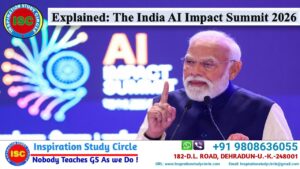
Explained: India AI Impact Summit 2026 Table of Contents India AI Impact Summit 2026 India AI Impact Summit 2026 The India
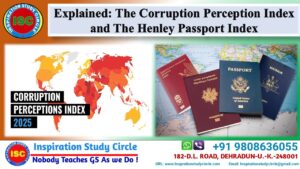
The Corruption Perceptions Index, and The Henley Passport Index Table of Contents The Corruption Perceptions Index, and The Henley Passport

India- USA Interim Trade Agreement (2026) Table of Contents India- USA Interim Trade Agreement (2026) In early February 2026, India and

Explained: India- EU FTA “The Mother of All Deals” Table of Contents India- EU FTA “The Mother of All Deals
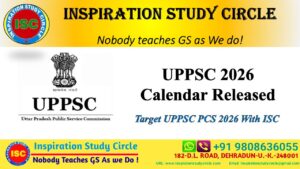
UPPSC- 2026 Calendar Released Table of Contents UPPSC- 2026 Calendar Released Brought to you by Inspiration Study Circle UPPSC- 2026
A Note from the Director’s Desk
(Director of ISC: Mr. Nisheeth Saxena)